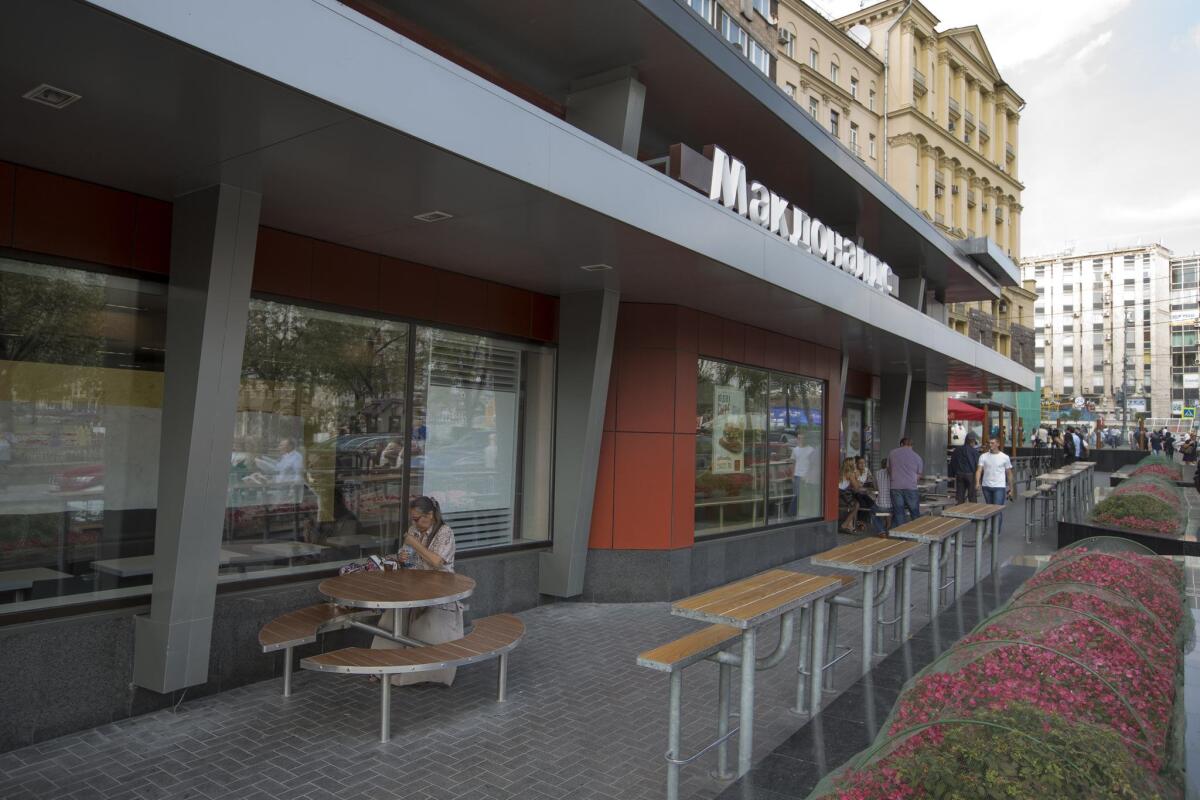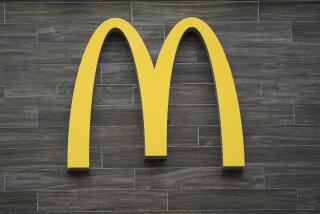Vladimir Putin brings the Cold War back to McDonald’s

McDonald’s long has been the great commercial bellwether of Russian-American relations.
The company stepped proudly into that role in 1990, when it opened its first restaurant in Moscow’s Pushkin Square and created an immediate sensation. There was worldwide coverage of the event, during which what was then the world’s biggest McDonald’s served a record 30,000 meals in a day.
Now the glow has worn off. As bilateral relations have cooled, many of the 435 McDonald’s restaurants in the country have become targets of national and regional officials. The company says officially that nine have been closed -- including the landmark Pushkin Square location -- but acknowledges that “more than 200 inspections have been initiated.” An earlier tally placed the closings at 12, but some may have been reopened. And there are scattered reports of shutdowns in far-flung regions of the country.
Reports in the Russian media say that some locations have been subjected to steep fines of as much as 500,000 rubles (that would be more than $12,000 at the current official exchange rate) as a condition of reopening.
Most of the shutdowns are for “sanitary” reasons, according to local officials and judges; in at least two locations, inspectors ostensibly found E. coli infestations, according to the Russian news website Iod (Russian for “Iodine”). The bacteria allegedly have been found in two restaurants in the far-flung outpost of Kaliningrad, according to the Russian news service RIA Novosti.
Iod published a “map of the hostilities,” pinpointing the restaurants that have been closed, targeted with inspections or are under investigation for breaking the law.
Some of the investigations go beyond food quality. In one Moscow neighborhood, according to Iod, a McDonald’s was fined 100,000 rubles, or about $2,400, for selling illegal toys with its Happy Meals. Earlier this month, a Moscow prosecutor reportedly launched an investigation of the city’s Ronald McDonald House charity.
Observers of Russian government strategies don’t have much doubt about what’s driving the war on McDonald’s -- the sheer number of investigations, their timing and their varied rationales give it away. It’s harassment, a signal of President Vladimir Putin’s unhappiness with Western criticism of his regime’s adventure in Ukraine directed at the single most prominent symbol of Western commerce.
In the words of Mitya Kushelevich, a Moscow blogger on cultural affairs who grew up in the McDonald’s era, “the closing of the very first branch is the writing on the wall for a lot of Russians. The message is clear and it’s not aimed at Americans, it’s aimed at us: the window to the world is closing.”
Kushelevich’s feelings aside, the crackdown almost certainly is aimed at the U.S. Russia’s $2.2 billion in sales accounts for as much as 8% of the worldwide revenue of McDonald’s, according to a market survey cited by Bloomberg. The Russian locations are almost all company-owned, according to the latest McDonald’s annual report, which means that it has made a disproportionately sizable capital commitment to Russia. As recently as 2012, McDonald’s was talking about expansion. To that end, it took a prominent role in promoting the Sochi Winter Olympics.
Now all that may be teetering, thanks to diplomatic and governmental maneuverings over which the company has absolutely no control. No one expects the Putin regime to order McDonald’s out of Russia entirely -- among other things, it employs nearly 40,000 Russians and is a heavy purchaser of Russian produce. On the other hand, no one expected Putin to seize Crimea either. Until he did.
Keep up to date with the Economy Hub. Follow @hiltzikm on Twitter, see our Facebook page, or email [email protected]
More to Read
Inside the business of entertainment
The Wide Shot brings you news, analysis and insights on everything from streaming wars to production — and what it all means for the future.
You may occasionally receive promotional content from the Los Angeles Times.











